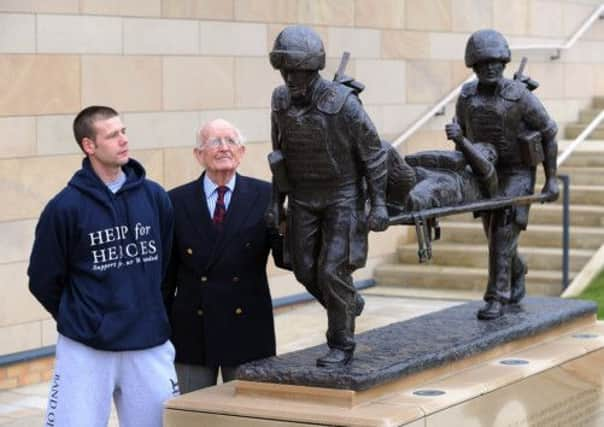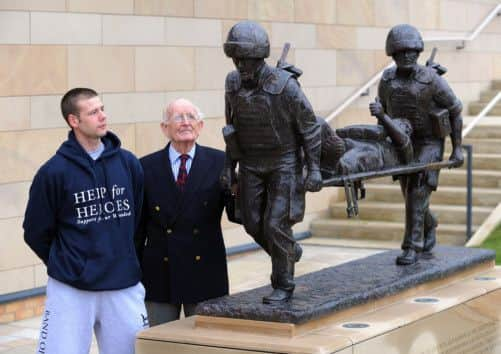Video: Showing casualties of war they’re not forgotten


Until a few months ago, Gareth Golightly was one of the Army’s forgotten casualties.
A vehicle specialist in the Royal Logistics Corps, his career ended in 2002 less than a year after it had begun when he lost a leg in a hit and run. Transferred to Headley Court, he received world class care, but two years later when he had been discharged from both the rehabilitation unit and the Army, Gaz, as he prefers to be known, quietly slipped through the net.
Advertisement
Hide AdAdvertisement
Hide AdHe struggled to adapt to life post-Army and, unable to find regular work, he became increasingly withdrawn. Seeing him yesterday, officially opening Phoenix House, the new Help for Heroes Recovery Centre at North Yorkshire’s Catterick Garrison, it’s hard to believe that just a few months ago he rarely ventured out of the family home in Teesside.


The £10.7m facility, designed to help sick and injured veterans, is the first of its kind in the north of England and the 31-year-old, who lives with his wife Denise and two young children, three-year-old Clarissa and 23 month-old Brianna, is one of the first to benefit from the service which includes a gym, art centre and access to practical support and advice on accessing everything from benefits to education.
“I did become very isolated, but I didn’t recognise it at the time. Denise used to say, ‘Gaz, you’re not your normal self’, but I didn’t understand what she meant. I think I’d forgotten what normal was. I guess I’m from the kind of background where you just get on with things. I’d been in the Army, I was involved in a crash and that was that. I thought I was making the best of things but, looking back, I wasn’t doing a very good job of it, I wouldn’t even take my two girls out by myself.”
The turning point came a few months ago when Gaz joined the Newcastle Eagles wheelchair basketball team. They told him about Phoenix House and in the short time the facility has been open, Gaz has been fitted for a new prosthetic leg, has trained for the Help for Heroes charity bike ride from Edinburgh to London and successfully enrolled on a college course.
Advertisement
Hide AdAdvertisement
Hide Ad“It was a bit of a revelation,” he says. “For the first time in a lot of years I’ve realised that there are opportunities and life can get better.”
For Denise too, the centre which offers support not just to individual veterans, but also to their wider family, has been a lifeline. The couple met in Headley Court where she was working in the NAAFI. Gaz proposed within a few months, but in the early years of their marriage, the couple suffered yet more heartache. After being told they were unlikely to conceive naturally, they were just celebrating Denise becoming pregnant when her brother was killed in Afghanistan.
Corporal Lee Scott, who at 26 was the youngest tank commander in the Armed Forces, died on July 10, 2009. He was one of eight British troops who lost their lives that day in what has become known as the bloodiest 24 hours of the Afghan conflict.
“Lee and I had been really close when we were little but as we got older our lives went in different directions and because he was overseas so much we didn’t speak as often as we might have done,” says Denise. “That made his death so much harder to take.
Advertisement
Hide AdAdvertisement
Hide Ad“There are some days when I want to talk about Lee and some days when I don’t but when I come here it’s just good to be around people who understand.
“If Gaz and I hadn’t found Phoenix House, we would have got through just like we’ve got through the last 10 years, but life just seems that little bit easier now.”
There may well come a time when the Golightlys don’t need the support of Phoenix House. They are both about to study accountancy and hope to set up their own business in a few years. However, the centre also exists for those like Martin Edwards who need full-time care. The 26-year-old Lance Corporal grew up in Leeds and was on his third tour of Iraq in 2006 when his armoured vehicle was hit a roadside bomb.
The sniper-trained Light Infantry soldier, who was left permanently brain damaged when he was hit in the head by a piece of shrapnel, lives at the Brain Injury Rehabilitation Trust’s York House and now visits Phoenix House twice a week where he takes part in art therapy classes.
Advertisement
Hide AdAdvertisement
Hide AdAs he gets to grips with another painting, those who have survived service on the frontline know that the demand for facilities like the one at Catterick is increasing.
In Iraq and Afghanistan there were just over 10,000 admissions to British military field hospitals and according to Brigadier Greville Bibby, Commander 15 (North East) Brigade, we are facing something of a perfect storm.
“The need for centres like this has never been so great since the Second World War,” he says. “Certainly the number of operations we have been involved in during the last 10 years has been almost unprecedented. Conflicts in the Balkans, Iraq and Afghanistan have generated far more casualties, suffering from both mental and physical injuries, than we have ever had before.
“We have to look after these men and women and that’s something we are definitely getting better at. If we talk of the Armed Forces as a family then like any family we have to make sure we are there in the bad times as well as the good.”
Advertisement
Hide AdAdvertisement
Hide AdPhoenix House is one of five centres across the UK opened as part of the Defence Recovery Capability initiative led by the Ministry of Defence. However, the care of veterans is not cheap and with the MoD not exempt from public sector budget cuts – in June it was told to make further savings of £875m in 2015 – resources are limited. It is why the involvement of charities like Help for Heroes, which funded the entire cost of building Phoenix House through donations, and the Royal British Legion, which along with other organisations will contribute to the running costs, is vital.
Help for Heroes was set up by Bryn and Emma Parry following a visit to Selly Oak Hospital in Birmingham in 2007. Until it closed last year, the hospital was home to the Royal Centre for Defence Medicine, dedicated to the care of injured servicemen and women.
“The only word to describe that visit is devastating,” says Bryn, who himself served 10 years with the Royal Green Jackets and has a son in the Army. “Of course you know soldiers get injured, but walking through those wards it stopped being an abstract and became very real. On our way home we stopped at a service station and right there Emma and I decided that we had to do something.”
While the couple had run a successful business designing and selling giftware and books, just two years later they sold the company to concentrate full-time on the charity.
Advertisement
Hide AdAdvertisement
Hide Ad“When I left the Army it was on my own terms, but I still missed it deeply, so I can only imagine how impossible life must seem if your career is taken from you,” says Bryn. “I remember quite early on asking one injured soldier what he thought of before he went to sleep at night. He said, ‘I try not to think too much, but you know what I really miss? I miss the wind in my face, my life has slowed down and I don’t know what to do’.
“That’s the same for so many injured soldiers. They go from a life where they are outside all the time, where they go parachuting and on desert tours to being stuck inside with nothing to do. We arranged for this chap who was a single amputee to go skiing. Suddenly he felt the wind in his face again and that meant so much. It showed him that he hadn’t lost everything.
“The war in Afghanistan might be drawing to a close but for the men and women who served in our most recent conflicts the battle is just beginning.”
For many that road to recovery can seem endless, but if the Golightlys are proof of anything it’s of the ability of the human spirit to fight on. “It’s amazing what they have achieved here,” says Denise. “I’ve got my husband back and the girls have got their dad back.”